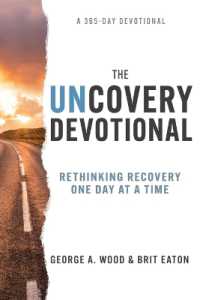- ホーム
- > 洋書
- > 英文書
- > Psychology
Full Description
Can everything be forgiven? Forgiving the small and average sufferings experienced throughout life is one thing. But what about bigger transgressions, like infidelity, abuse, or even large-scale offenses such as genocide? Showing that forgiveness is the healing of the heart's wounds as well as the revival of love, Olivier Clerc looks at what prerequisites might be needed to enter into a process of forgiving and what the effects of doing so might be, for oneself as much as, if not more than, for the perpetrator. He identifies 15 obstacles to forgiveness--prejudices, confusions, false ideas, misunderstandings--and discusses where these perceptions and obstacles originate from, which keep many of us from taking the path to healing.
Exploring how to overcome the obstacles to forgiveness and how to let go and change our thinking, the author details four practical methods for forgiveness, each with a unique approach: the Hawaiian practice of Ho'oponopono, Colin Tipping's Radical Forgiveness, Fred Luskin's Nine Steps to Forgiveness, and the author's own Gift of Forgiveness, inspired by his work with don Miguel Ruiz. Drawing from his years of forgiveness work as well as from the Forgiveness Project, he shares inspiring testimonies and examples from both victims and perpetrators who have rebuilt their lives after trauma by walking the path of conscious forgiveness. Clerc reveals how choosing to engage in a conscious process of forgiving our perpetrators--while not without struggle--helps stop a spiral of destruction, cleanses the heart, and leads to relief, freedom, and inner peace. Even when faced with the unspeakable, forgiveness is a path we can all take and in doing so we recover our full capacity to love and find happiness.
Contents
Foreword by
Lewis Mehl-Madrona, M.D.
Preface
PART 1
Forgiveness Defined Forgiveness -- What Is It Really?
Forgiveness or Healing the Wounds of the Heart
PART 2
The Main Obstacles to Forgiveness and How to Overcome Them
1 Forgiveness Would Exclusively Be a Religious
Practice Practical Method #1--
Forgive for Good: Dr Fred Luskin's 9 Steps
2 Forgiveness as Outmoded and Outdated
3 Forgiveness Would Mainly Be a Gift to the Other
4 Forgiving Would Amount to Condoning, Accepting, and Excusing
5 Forgiving Would Be Impossible without the Other Offering Their Apologies or Asking for Forgiveness
Practical Method #2--
Colin Tipping's Radical Forgiveness
6 If We Have Forgiven, We Should Forget
7 Forgiving Would Be Reconciling
8 Mistaking the Person and the Action
9 Seeing Only the Personal Dimension of the Action
Practical Method #3--
Ho'oponopono: The Hawaiian Approach to Forgiveness
10 Wanting to Understand Immediately What You Are Experiencing
11 Forgiveness and Arrogance
12 Asking for Forgiveness Would Induce Feeling Guilty
13 Asking for Forgiveness Would Be Humiliating
Practical Method #4--
The Gift of Forgiveness: Four Progressive Requests for Forgiveness
14 Forgiveness Would Be a Sign of Weakness
15 Wanting to Do Things Too Quickly
Conclusion
Can Everything Be Forgiven?
Bonus
The Metaphor of the Two Clouds
Recommended Reading
The Forgiveness Project
Acknowledgements
Index
About the Author







